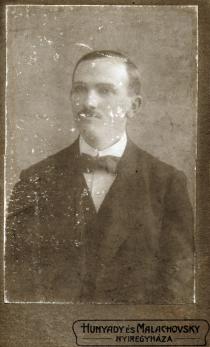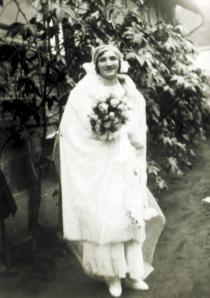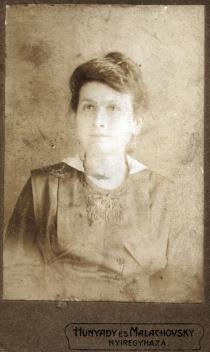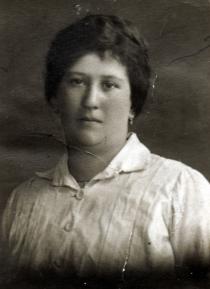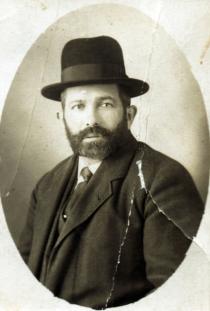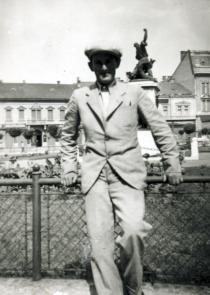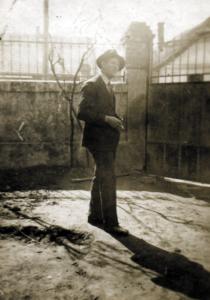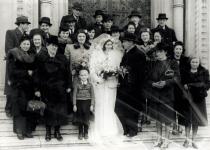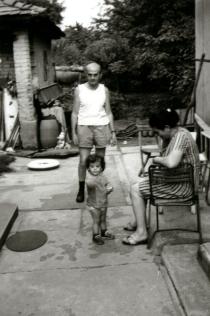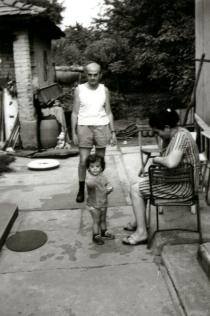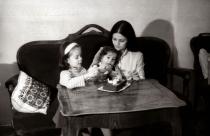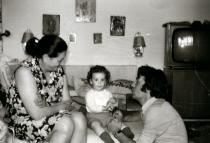
Blanka Gallo
City: Budapest
Country: Hungary
Interviewers: Dora Sardi and Eszter Andor
Date of Interview: March 2002
- My family background
I don’t know much about any of the (grandparents), because they lived in Munkacs (Munkachevo, today in the Ukraine), I went to Munkacs with my mother as a child, in 1937, before the Hungarian Felvidek 1 was re-annexed to Hungary – I was there at my maternal grandparents. That’s to say they were not living by then but great uncles and aunts. (Anyway) when I was there I saw a May 1st parade for the first time. Bearded Jews processed with red flags and red carnations.
I (remember) very little. (The grandparents lived in) a house, but not by themselves but with others round a courtyard. I remember my paternal grandfather. He was called Saul Leimseder. Both grandfathers had beards. (Saul) was very old by then as far as I remember. He was deported from Munkacs at the age of 86. I remember my grandmother, Taube Hammerman, too. My paternal grandmother died of cancer, I can’t say when.
Dad had a sister Auntie Roza, who was called Weinberger, she lived in Munkacs and had seven sons and a single daughter. They rented the mikvah and ran it. The only daughter Manci was in Nyiregyhaza when the Germans invaded. Then Jews could not travel on trains so she couldn’t get home. But she met her mother in Auschwitz and when her mother was selected for the gas chambers Manci wanted to go with her, but her mother begged her not to and she survived. And as far as I know two or three boys survived too and they left in 1945-46, presumably to Australia.
We don’t know anything about them. Then there was Auntie Frida who lived in Satoraljaujhely, and her husband was also a fruit wholesaler. They only had sons too. Two of her sisters lived in Nyiregyhaza, Auntie Etel – known as Mrs Grunberger – who was also a fruit wholesaler for a while. Theirs was a childless marriage. And there was Auntie Cili, who helped them, she wasn’t a partner but helped. There was Hugo.
He was born in 1901 and was unmarried. He was a partner of my father’s, but there was never any quarrels between them. They adored each other. Hugo was not religious. If one of my siblings or I wanted something, but didn’t dare say anything to the parents, it was him who noticed and did something about it.
He lived in Nyiregyhaza (after the war) and continued the business until it was taken over by the state. But (even after that) he continued in the trade. If I am right he married a girl in 1947.
We used to go over there, as if to our parents. My father was one of twins. His twin went to America. But we did not keep in touch with either my mother’s relatives in America or him. And there was another sibling who was also in America called Auntie Milli. And another brother of my father’s lived in Beregszasz (today Berehovo, in Ukraine), Uncle Sanyi. We didn’t really know anything about him.
Then there was Fancsi another sibling who lived in Kisvarda. There were lots of children (there). Her husband returned from forced labor and then immediately went off somewhere, I don’t know where. And my father had yet another sibling – called Uncle Geza – who was famous for his physical strength.
They said that he could lift up a cart with one hand. He married, I don’t know whether his wife died in childbirth but he remained with two daughters who were also sent to Auschwitz. And he died young too. I believe that it was precisely after a great show of strength that he perspired and died of pneumonia. They lived in Munkacs (today Mukacevo, in Ukraine) with my paternal grandfather.
My maternal grandfather was called Izrael Ostreicher. He had had a mill but then he got ill and died young. I remember him in my childhood lying down and being very thin. Izrael died sometime in the 1920s, probably in the second half.
My maternal grandmother was called Margit Herskovits. She was at home, that is a housewife who raised the children. My grandmother died the year when I was there. And I remember that she lived with her three children.
One of them, Zali, was a spinster, another Dora was divorced and had a son, Jahele was his name, I believe. The third Uncle Sie – we called him that –, who was also divorced but had a daughter from his first marriage called Manci, who lived in Pest.
She escaped and went to America in the 1950s and became terribly religious. Her mother was not, but over there she went very religious and did not get married. I don’t know where she worked at the beginning but by the end she worked in the White House library. And she was fantastically charitable.
Then there was a brother of my mother’s, Uncle Adolf who also lived in Nyiregyhaza like us. He had a glass shop, glass and porcelain. He was well to do. He had three wives and three children. One survived, Jozsef, who was taken prisoner-of-war by the Russians after Ungvar (today Uzhorod, in Ukraine) was liberated.
He returned in 1947, was at home in Nyiregyhaza for four weeks, and then went out to Israel. Then there was Aunt Lenke who lived in Nagyszollos and at the age of 24 was left a widow with three children and did not get married again. She was also deported with her children. Then my mother had a sibling – I don’t know the name – who lived in America and had a restaurant.
Only one aunt survived on my mother’s side, Aunt Kati who (lived) at first in Munkacs and then in Pozsony (today Bratislava, in Slovakia) and when they (the Germans) entered Slovakia they went back to Munkacs and came to live in Pest. Aunt Kati did not hide, her husband and son Jeno were deported. And extraordinarily, they all survived. She had an only child and they all survived. And I see Jeno regularly.
- Growing up
My father was Jakab Leimseder. He was 60 in 1944 and mum was 55. She was known to everyone as Aunt Mariska. My father was a tropical fruit dealer in Nyiregyhaza. Until the outbreak of the war in 1939 my father brought the fruit from Italy. There (were) oranges, mandarins, chestnuts, dates, grapes, figs. It was a big business.
The shop was totally separate and had a big warehouse. Since my father sold to retailers. My father was the only tropical fruit dealer beyond the river Tisza. So they came from all around Nyiregyhaza to buy from him. He always traveled on Saturday night or Sunday morning.
The big center was in Trieste. And he came home either on Thursday night or on Friday – in the winter months. The business was closed on Saturdays. He started to export in the summer months. Beginning with morello cherries, apricots and apples which were the biggest.
At that time there was only a big refrigerated store in Pest but it wasn’t a problem as the storehouse was cool enough to store fruit in the winter but he would take huge amounts of apples to the Pest fridge after the apple harvest as you could get the best price for them in the spring. He rented huge orchards – including Prime Minister Kallai’s, for 100 thousand forints a year in pengo (pre-WWII Hungarian currency).
It was an orchard of around 100 acres and in August there was a great harvest and then Kallai called my father over to Kallosemlyen to tell him how good the harvest was and how cheap he had rented it for. Then my father asked ‘Sir, do you want to use force? Because if so, I’ll rip up the contract.’ In the end they agreed that he would give back 50 thousand pengo and half of the fruit would be his.
But he promised to bring my two brothers, who were forced laborers in the Soviet Union, back home. It wasn’t his fault that he could not do so. He was attacked so severely he couldn’t do it. (At home) there was loads of fruit. They would sift through, for example, the oranges from time to time.
My mother gave birth ten times. The eldest – I don’t know the name – was run over by a tram at the age of six before my parents’ very eyes. And another died of scarlet fever. And my mother miscarried once too. Gitta was the eldest (child) She was born around 1910-11 and had three children. She got married and lived in Derecske, then in Hajduszoboszlo and finally in Papa.
Her husband was a leather merchant and did business in Debrecen. (His name) was Jeno Basch. (During the war) he paid to be in the mental ward of St John’s hospital in order to avoid forced labor. He played the lunatic but ate kosher, they got his food from some kosher restaurant. But during the last Purim he got his papers (to go). My father knew enough about what went on that he told him not to think about playing mentally ill out there.
The next (sibling) was Margit. She was born in 1914. She got married to Erno Frankel from Kassa (today Kosice, in Slovakia). He had a paint store in Slovakia, after he went back to Kassa – as that was on Hungarian territory -, he traveled. And it is typical of the family’s closeness that in the final year Gitta, like Margit, came back with her children so that they could be with the parents.
And they were all deported together – and Margit and her little daughter did not return, Gitta survived and died in Budapest in 1970. (Both their homes) were completely kosher. Gitta even wore a wig, Margit did not have one but at home, in our parents’ house she wore a scarf.
Zoltan was born in 1916 and helped in father’s business. He was the only one who attended yeshiva. Then there (was) Hugo, he was born in 1918 and he also (worked) in father’s business. Both were in forced labor and they did not come back.
I, Blanka, came next in 1922, then Geza in 1926 and Sanyi in 1928. My father was not only a fruit dealer, but exported to many places – lots to Poland, Czechoslovakia and some even to Hamburg – and the boys helped. Both Gitta and Margit were often in dad’s office, doing bookkeeping. But I did not.
Jews lived all over Nyiregyhaza. There was a Jewish district but the better off did not live there. We, for example, lived first in Bocskay Street, which was in the heart of town. There was a bakery in the same street. Then later in Kossuth Lajos Street which was also a main street as the tram went down there.
The Kossuth Lajos Street place had four rooms, a glassed in veranda, a big kitchen and a maid’s room. There were two other apartments (in the block) on the other side. We rented them. My father was well off but he did not put to much emphasis on buying property.
Mum put us girls to work, we had to do everything from the age of ten. A little at a time, but always something, as they said that we had to learn this as one could never tell what life would bring, and if you are not forced to do the housework yourself, at least you could run the household staff. We learned crafts at school, that is, knitting, crocheting and embroidery. And the routine was that we helped in the morning and in the afternoon sat down to sew. There was a permanent maid.
She lived there and in addition there was a washer woman for the big washes – because they washed the bedclothes once a month then – and at the same time did a big clean. In the final years there was a Jewish maid. When the Felvidek was annexed to us they were very poor and they often came (to be maids) at first because a lot of Christian maids reported Jewish families. But later it became illegal to employ Christians because of the anti-Jewish laws. And last of all we had a maid called Fani, a big fat woman.
She ate alone in the kitchen, not with us at the table. And I will always remember it because I thought it strange that she ate by taking a spoonful or a bite and then a sip of water. She saw me in Auschwitz and I heard „Miss, Miss!". And she brought me a flask – everything was of value there, even a spoon – But I nearly fainted, there, where everyone used the familiar address, there was no caste system, there we were all prisoners, just the same.
The grandparents must have been religious (as) even my own parents were Orthodox. They obeyed every Jewish law to the letter. Which meant that on Friday afternoon they got ready, cooking the holiday lunch. There was (only) a light lunch at noon. Then, when the holiday began, the men went to the synagogue, the women did not. (In Nyiregyhaza) there were two separate ones: the Orthodox and the Status Quo 2. Both were big but there were also many prayer houses besides. The Orthodox one survived but the Status Quo one was blown up. It was very beautiful.
My father attended the Orthodox one. It was (not far from us), there were no great distances in Nyiregyhaza. My mother laid the table with a wonderful, snow-white tablecloth and lit lots of candles – because (she lit one) for every child and every dead relation. I don’t know (how many exactly) but I do know that there was a five branched silver candlestick, but she lit at least ten others as well. And the table was laid and there were two chalas (on) the table. She baked them. And they baked bread. They did it by taking it to the bakery as we had no bread oven. And the Saturday cholent was also taken to the bakery as they could not heat it up, and the following day the maid brought it at noon.
We were not even allowed to carry it. One couldn’t even carry a handkerchief. In Munkacs it was allowed because a part of it was fenced in (Editor’s note: According to Jewish law, carrying things in public space on Sabbath, even one’s handkerchief or keys, is forbidden. Public spaces could be turned into private spaces if they were surrounded by a so-called eruv line and within the eruv line Jews were allowed to carry things even on Sabbath.).
Well, on Friday night supper was usually fish in aspic, followed by meat soup, pasta granules and some sort of pudding. They kept this warm – then there was no gas but a wood burning stove – by putting it on this because they were not even allowed to warm it up. Friday evening, like Saturday evening, began with (my father) saying a bracha over the wine and then giving everyone a drop to taste. He did the same with the chala, he prayed and then everyone got a bite. On high holidays – that is Rosh Hashanah, Yom Kippur and Tabernacles, right up until Simchat Torah – he put honey on the chala, otherwise it was salt.
On Saturday morning my mother went to the synagogue. The girls did not go only the women. She returned at noon, there was still some aspic left over. They did not warm anything up but ate warm cholent and made fruit soup in the summer. But they did not mix it up with sour cream, as they do today, but with eggs, because that was a pair
(Editor’s note: She is referring to parve, that is, food that can be eaten both with milky and meaty food – this is why it was called pair.). But there were many other things too. There were separate dishes for meaty and milky food, and a separate cupboard and table for them, and there was the pair (i.e., the parve) which had nothing separate.
The fish, eggy onion and cholent were hors d’oeuvres, and then there was cold roast and in the summer cold soup too. And towards evening only the men went to synagogue, and when father came home he performed havdalah. That meant he lit two candles and there was a long plaited candle which he also lit, and I remember that he prayed and afterwards he poured a little fruit brandy onto a tray on the table and lit that too. And there was a psamim case. All I know is that they say that Saturday night will set the tone for the whole week. That’s why we had to sniff it. Only the men sang zmirot on Friday, and sometimes at noon on Saturday too.
My mother, like my father, spent fantastic amounts of money on charity. But not for the religious community but for individuals, Jewish families. And how diplomatic they were! It was a big thing to provide proper food on Saturdays. And on Thursday evening Mother sent money to a few families. On Thursdays, because that was when the men were at synagogue and would not be humiliated by it. There was a women’s association which my mother regularly attended. They (did) mainly charity work. I also remember that there were performances but boys did not perform these with girls.
At Rosh Hashanah my mother always went to synagogue. She had clothes especially for this purpose and wore the same clothes at Yom Kippur too. Then there was Tabernacles, so after Yom Kippur they immediately started to build the sucha.
They made the sides out of rushes and the roof of reeds. And we children made various decorations and stars and decorated the sucha with them, and my father only ate there during the holiday. After that was the big holiday Simchat Torah – then they finish and start anew the Torah. And then it was wonderful as my mother made something very special: roast meats.
There was a time I recall when she beat out the beef and minced chicken, put this on the beef and placed hard boiled eggs in between, then she kneaded and roasted it. She did the same at Purim. And there were lots of cakes then too. We sent them to lots of places and we were sent some as well.
At Shavuot there were lots of flowers in the apartment, they even put flowers in the chandeliers. And I remember that the apartment was full of walnut leaves – which have a very nice smell. Mother never went to synagogue in the evening, only in the morning.
There was a big clean up (before Pesach), and separate dishes. (At Pesach) tsibere is made – this is done very carefully, there was a completely separate bit on the table. Beetroot is peeled, chopped up finely, sprinkled with water and salt and left to ferment. And this is how it gets its slightly sour taste.
They made it raw, they only boiled it and beat in eggs so it would be pair (i.e., parve). And they ate it cold and put hot potatoes in it. That’s how we do it isn’t it? Well, I remember Mum would buy a goose in the winter and cooked the fat and the liver separately in a Pesach dish. And she put it in fat for Pesach, and on the eve of Pesach there was tsibere soup and crackling with potato and liver. And in the evening (that is on Seder night) there was a big supper which was meat soup etc. etc.
But at home they did not brakk, which means they did not make matzah balls from matzah flour then only on the final day. You weren’t allowed to put matzah balls in the soup either, but they made pancakes with potato flour, as that’s allowed, and they cut them up into ribbon noodles and put that in the soup, or potato dumplings. I don’t remember how they made those. Not everyone did this, only the very religious.
They bought matzah from the community, but Dad always went at Erev Pesach, or maybe earlier, and he baked them separately. This matzah had a special name: shmira matzah. It was not kneaded by machine but by hand, and rolled out by hand and it was rounded. And on Seder night it was on the table. And my father prayed, that is, made a bracha over the matzah.
On that evening my father wore a kitl, there was a big armchair, a pillow and he was in white, and as we read the Haggadah, the youngest asked the ma nishtanah. And as we read, he stopped at a passage and one of the boys had to explain its meaning. Then there was nayn teg. This was before Tisha be-Av. And then, apart from the Saturdays, one can only eat milky things (and) fish. And at Tisha be-Av they fasted. They did not tear their (clothes).
The butchers were kosher. There was a grocery too. For example when they shopped for Pesach they only went to kosher shops. At home they leavened the bread but took it to the bakers to bake and chala was also (leavened) at home. Kosher milk, butter and cottage cheese were brought to the house from some village.
The meat was made kosher. Fruit (was bought) at the market as were live geese. They took them to the shochet, brought them home and made them kosher. Fish did not need to be made kosher, you could cut that up by yourself. When Rosh Hashanah or Yom Kippur was on all Jewish businesses were closed.
My father always wore a kipa, made of black velvet. In the past they were only made of that. He dressed in a suit and hat. He wore tzitzith – boys also wore them under their clothes. He went to synagogue every morning. My mother had a wig – and she wore it at home too.
At night she tied her hair up (in a scarf). (In my girlhood) I accompanied my mother to the mikvah. I was there before my marriage too. I believe they went to mikvah two weeks after menstruation and until then, not only could you not make love, but were not really allowed to touch. (My parents) had two separate beds and there was a bedside table in between.
I remember that these boys – I had two younger brothers –attended the cheder from the age of three. I don’t remember but Aranka, who lives in America, told me that papa woke the two young boys at five in the morning as they had to go (to cheder) at six, and he always said that my heart breaks for the children but I must send them. So that’s how they studied. I believe they went (there) until they entered school at six years old but maybe they went for longer. My eldest brother Zoltan attended yeshiva, but I can’t remember where. But he didn’t go for long. The boys continued to study on Saturday even later. I can read Hebrew too. There were lots of religious books at home. I had lots of prayer books too.
I don’t observe Saturday [Shabbat]. I always light two candles on Friday night and go to synagogue on Rosh Hashanah and Yom Kippur, and when there is the maskir. I only attend synagogue then. There is a synagogue here in Ujpest. And I don’t travel at Pesach, Rosh Hashanah and Yom Kippur. This is just tradition because I don’t run a kosher household. And I do one more thing at Pesach: I don’t eat bread for eight days. That’s all.
We spoke Hungarian at home, but mum and dad spoke Yiddish especially if they didn’t want the children to hear. Yiddish not Hebrew. But Hungarian was (their mother tongue), because I remember that the grandparents spoke Hungarian. Anyway in Munkacs all the Christians knew Yiddish.
They negotiated in Yiddish. I remember that I went with my aunt to the market and she spoke Yiddish with the peasant women. I can’t speak (Yiddish) but I understand a lot. Yiddish is very like German. And anyway at that time I leared German.
I completed four years of middle school. But at that time the primary school was Jewish, I graduated from there. And there was religious instruction class for all denomination. So Jews also had religious instruction and the assistant rabbi came. He taught me once a week.
We went on Saturday but did not write. And a maid brought our bags. The Jewish school was where the Status Quo synagogue was, in its yard. In fact there were lots of apartments and the teachers lived in them. And we would meet there, and sometimes we went for a walk. And then a crowd always gathered there -- Jews.
There was a real caste system. I’ll give an example. I had a classmate, a Jewish girl, her father was a waiter. We were in the same class and lived in the same street and went home together. And my father saw me with this little girl and made me swear never to be with this girl again. As then the merchant looked down on the artisan.
The Orthodox really opposed Zionism. I was still going to the Jewish school and there were performances before various holidays in which we children took part. I was in one. „I will be a shomer, a weapon in my hand I will guard, there’s no need to fear." – I had some text like this dressed in boy’s clothes, with an imitation weapon on my shoulder. And my father was terribly attacked about this, that his daughter was a Zionist.
I wasn’t, it was just that the teachers told me to say it, that’s all. But the Orthodox opposed it. At least a third of the middle school was Jewish, I don’t know exactly. There was no (anti-Semitism) then, but later one heard more and more frequently about the beating up of Jews, and my sister Gitta was even beaten up badly by university students in Debrecen.
We spent the summer with aunts and uncles. And relations came to us too. My mother had bad rheumatism in her leg and we went to Hajduszoboszlo for the summer and she took me with her. There was certainly a synagogue but we didn’t stay in a hotel but in a private house with a Jewish family. But she didn’t eat there, there were several Jewish restaurants. (There) were strictly kosher restaurants there, and not only one.
And later, when my elder sister Gitta lived there, we were often at hers. But apart from that we were in Munkacs with my aunt and grandparents.
- During the war
(When war started and the deportations) my father reproached me for not getting married. He knew a lot about what was going on in Germany, and Poland, as refugees came and spoke about what had happened. Slovak girls were taken to the front to brothels and my father feared this would happen to me. And he made me promise that when we arrive – we didn’t know we were going to Auschwitz – I must say one of my suitors’ names as if I were a wife.
Before deportation my father made Hugo (his brother) promise to look after me. Hugo was in such a state at the end of the transport that he was among the dead. And one night he came to and remembered what he had promised my father, about looking after me. He crawled back through the living, on all fours, into the barracks. On the second or third day he was liberated otherwise he wouldn’t have survived.
I remember another thing: my father pulled himself up and said that he could work. But even he didn’t believe it, otherwise he wouldn’t have asked Hugo to look after me. My father was a very charitable man as was my mother, they helped many poor people.
They helped the refugees who came from Poland and Czechoslovakia financially. And one of the Poles wanted me to come with him to Pest. I could have had Christian papers too because one of the maid’s papers was at ours, and I could have gone with those. And there was a Christian merchant who was in business partnership with my father, they would have hidden me as a maid – that was one.
The other was at the apple harvest in the fall, the apples were sorted by size. Then about two-three hundred women worked there. And one of them came into the ghetto with her father and begged me – they lived on a homestead – to go with them and they would hide me. But I didn’t want to go with either of them. And today I’m still glad I didn’t because I would have suffered a lot more, being there and my parents and siblings never coming home.
When we put on the yellow stars my father’s business was still open for while – all the Jewish businesses were – and I went home at noon with my father and we wore the yellow stars. And two workers came towards me and the younger one made a sarcastic comment about the yellow star, and the older said to him ‘watch out because the Russians are already at Korosmezo’.
At this my father whispered to me that he didn’t know which was worse. Well, when on the last day of Pesach they started to bring in Jews from the surrounding villages, it was terrible, when we saw the first group.
Despite the fact that Kossuth Street was a main street one of its sides was the ghetto for while. And they put four hundred country Jews into the ghetto. And my father – as I said he was a well-to-do man – did not accept anything from the Jewish community, but there were still those who brought food to our house and he fed them (the Jews from the countryside) with this.
After a while the ghetto on Kossuth Street was closed as it was a main street. Imre (my future husband) lived in the parallel street with his mother and we were there for a while. Then one day the gendarmes appeared and told everyone to pack up as much as they could carry and took us to Nyirjespuszta; this is a few kilometers from Nyiregyhaza – the property of a Count Molnar – here we lived in barracks.
At that time they kept tobacco or something there, so there were no bunks but boards. And there you could decide whether to work or not -- you know, so that you wouldn’t be shut in and could take your mind off things. They took us out to single turnips and when we were coming back the peasant women who had taken food into Nyiregyhaza, were coming home. And I started to talk to one of them and she had ten eggs and she had butter in a half liter jug and while we were speaking I showed her what kind of underwear I had on.
I took it off and got ten eggs and half a liter of butter for it. There was a girl called Trencsenyi who (ran) this Nyirjesi homestead, she was terrible, she laid people on the ground, old people too, and tied people up. I had a big apron which I made there and it had a big pocket. And I put the eggs and butter in it and I was worried that Trencsenyi would make me lie down with the eggs. And then happily I gave them to my mother. And they deported us from there. Gitta went with her family on another transport, and we went with the last one. We arrived in Auschwitz on 6 June (1944).
The Polish prisoners told us to give the children to the old people as they would look after them – as they knew what was going on. My mother-in-law was in the same transport as Gitta, and my mother-in-law took the three children. Sanyi, Geza, Margit, Erno and little Juliska, my parents and I went together. And I remember that my father begged the two boys to escape. But this would have been dangerous and they didn’t.
We arrived in Auschwitz. It began with having to undress totally and being shaved everywhere. And the SS guys stood about and laughed. And when we came out (of the shower) – no soap, no towel, nothing – we were given rags instead of clothes.
We were put in a barracks where there weren’t even bunks, we lay on the bare earth in a pile. We were so naive that we didn’t know what happens in a lager – after a month. They didn’t tell us. When we asked what it was that was burning, they said that you brought so much rubbish. The SS said that the old people looked after the children. And that they have much better provisions than you.
We were not long in Auschwitz, after about three of four weeks we were selected again – well, we were still in good shape. And then we got striped clothes and white kerchiefs, and in these we were put in a wagon and taken to Riga. There was a work camp there. There were lots of Rigans. And you could buy lots of things for money. And there they executed people by taking them out – the camp was in a forest --, taking them out into the forest and shooting them in the head.
When the Russian front drew nearer they made a huge selection. After this they put us on a boat and took us into Danzig (today Gdansk, Poland) by boat, but it was terrible. I was hit here, for example, for the first time.
It was a cargo boat and we were in the lower hold. It was very hot, the WC was upstairs. And there was a long queue and by the time you got there it was too late. And there was a Hungarian-speaking SS soldier who allowed a few of us to go into the bathroom and a striped suited woman came in, (the suit was marked) with black points – these were common criminals - and hit us all over because we dared to wash.
Well, two boats left Riga at the same time, the other one was sunk. They took us from Danzig to Stutthof. We were there for about a week. And they took us to Lowen – at the mouth of the Elba --, five hundred Hungarian women. And there was the camp commandant who was very humane. And everyone got two blankets and a bunk to themselves and the food was relatively bearable.
But the front was approaching, and on 12 April 1945 we were taken away and walked 600 km and they took us to Ravensbruck. They showed us off at Ravensbruck as if we were miracles, because compared to them there we were in an alright state. And there they put us in wagons to takes us to Sweden for an exchange of prisoners, that is, for German prisoners. But there was no engine by this time, so we went on foot all the way to Malchow (Editor’s note: a subcamp of the Ravensbruck concentration camp). And on 2 May 1945 we were liberated.
The Russians liberated us. The result was that we women did not dare go out on the street, we were scared because they raped. One day the Russians announced that there is a Brandenburg camp (Editor’s note: a subcamp of the Sachsenhausen concentration camp), I don’t know how many kilometers from Malchow, and we must go there, as they will take us home from there.
We didn’t dare set off, we were scared of the Russians. There were about 10-11 of us who made friends. And Italians came towards us – their national flag is like ours in reverse (like the Hungarian one) -- and one of us called out, are you Hungarians too?
Only for fun as we knew they weren’t. And finally we stood near these boys and they said they were going to Neu-Brandenburg, they had a car and we should go together. We set off with them but were worried what would happen in the evening. And we got somewhere in the evening, and these boys just chased the Germans out of the apartment – these were two-storied houses -- and started to make supper, they cooked in a pot (where they got it from I have no idea) and laid a huge table with a cloth.
Afterwards everyone wanted to lie down. And the boys asked if they could take us up. And we said, until the door. And they were very kind to us. And we arrived in Neu-Brandenburg and the Slovaks were taken home in groups by truck. And as my elder sister Margit was originally living married in Kassa (today Kosice, Slovakia), we said we were Slovaks and they took us in a truck to Prague.
We were there for three days in quarantine and then got aid. We got to Kassa from Prague by going down to Pozsony (today Bratislava, Slovakia) and from there up to Kassa. (From there) we arrived with great difficulty back in Nyiregyhaza. Not a stick of furniture survived, they had taken everything. Not even a photograph remained.
My brother Hugo was a forced laborer in Kisvarda, he was taken from Kassa at the end, and my father came home from synagogue one noon. They had a telephone not only in the shop but at home too – a rarity in those days. And he said to him that he had a bad feeling about Hugo. I should go to the neighboring grocer and telephone and ask on Saturday. Well, of course it is allowed if an ill person wants something, then everything is allowed. (And all it was) was that they his suit had been stolen.
My husband was called Imre Grossman and he magyarized it to Gallo. I believe we were still in Nyiregyhaza when he magyarized his name. (If I hadn’t had a Jewish suitor), they would have denied him. They would have sat shive. (My husband) was born in 1911 (before the war) he was first of all a merchant apprentice, then a commercial traveler. I believe in coffee.
His father had a textile business. When it went bankrupt he started to travel and he took it over from his father, when he got ill and later died. His father died around 1940 and he still has a gravestone in Nyiregyhaza. He provided for his mother because my brother-in-law was an articled clerk and had married earlier. His mother had not, but his father had come from a very religious family, but they were not as religious as we were.
My mother-in-law did not wear a wig. And my husband became very religious (after the war) – perhaps in memory of my parents. Every Friday night, and Saturday he went to synagogue, and every holiday – of course when he no longer worked. And at home every morning we prayed in tallith and teffilin. In the final days before his death he concentrated on himself a lot, in order to divert his attention, but then he did not want to pray.
My husband was courting me. But my parents (did not wish) this marriage, because he wasn’t a rich boy, and I didn’t want to get married because both my sisters’ husbands had to go to forced labor and I didn’t want to get married.
This was 1942, and from 1943 to March 1944 he was in forced labor in the Ukraine. Having typhus he went down to 25 kilos and was in a terrible state. And afterwards they were deported and a Nyiregyhaza woman hid not only him, but two of his companions, until the Russians came. So on the night of New Year 1944 he was in Nyiregyhaza.
After the war
The wedding was on August 19th 1945 in Nyiregyhaza. It wasn’t in a synagogue because the Orthodox don’t hold them in synagogues but in the courtyard. But it wasn’t that courtyard but the Joint had a big place where those who were in need of ate.
The supper was made there but we paid for it, but we held it there because there were big rooms there. There were seventy or eighty people, that is, it was a big wedding. And then things were such that we did not travel.
They were two brothers (my husband and his brother), the elder, Frigyes, became a lawyer and married (my elder sister). It was her second marriage. We got married first, because she was still waiting for her husband to return. And when he did not come home and my brother-in-law’s wife did not either, they, after a while, got married. And they had a child who went to America in the 1970s. And he died young, at forty, of cancer.
At first I did nothing. In order that life should start again in Nyiregyhaza the mayor appointed people to open various shops. My husband opened a grocery warehouse, with a partner, not alone. And there was also a delicatessen. And when the state take-over started I was in the delicatessen with my husband.
My daughter Judit was born in 1947. I helped in the delicatessen and, apart from the maid, there was a young girl who looked after Judit so I could work.
We wanted to emigrate in 1949. At first it was to be Israel. I can’t remember the date, only that Judit had been already born. And we had prepared so much that I even got a tranquilizer from the doctor so that (Judit) would not cry when we crossed the border. It was to be a Sunday. And those who organized the trip for us went to look round on Friday to make sure everything was alright and they caught them and locked them up and that’s why we stayed.
But Nyiregyhaza was a small town everyone knew we were going. We had told everyone we were going to Pest to live. (So that) it was imperative to go to Pest to live. When we came up, Margit (my sister) lived in a rented room with her husband, there were no children then, we lived with my aunt Kati, until we bought a flat. And then we bought a three-roomed flat with a hall in Zoltan Street and we lived together (with Margit’s family).
And I was at home for a while and Imre found a job through a highly placed Nyiregyhaza man at Betex (a textile company). I remember that the 630-forint pay was very little but at that time we had a little extra for a while. He found a place as an assistant salesman and – because textiles was his trade – he was for a long time the deputy director of the business, as some party functionary, who did not understand the trade, was the director, and he was never seen. And in the end he became the director, he ran the silk department. And retired from there.
In 1951 – financially we were forced to by then - I also found a place in the restaurant business. I had one place of work. I started as a cashier and then became the manager. I ran a cafe which was open until midnight and there was the little one, the family, well it was impossible.
After much pleading I was demoted to works clerk, at my request. Then I worked in one of the bars as a clerk, that is, from eight until four -- the deputy manager died, and the boss asked me if I would take on as deputy. I said yes, if I was given a clerk’s shift and that meant on Saturday until noon and not coming in on Sunday. We put her (the child) into nursery and for a week she just crouched in the corner and cried, she couldn’t bear it.
So I took her out. My elder sister Margit, while we lived together, worked, wove scarves somewhere and looked after her own (child) and Judit. But Imre’s work was very close to home and Imre often took her with him.
In the summer we took her on holiday. So we went on holiday, took Juli (Margit’s daughter) and Margit’s family also took Judit. At that time we had two two-week holidays (which is why) we placed her (in a children’s summer home) in Pest, chiefly on Svab Hill. There were families there who for years had been taking in children and taking care of them.
At the beginning (Judit) didn’t like it. It was laid down that she could be visited once or twice a week, she always cried when we left. (When) she was over ten there was a woman who took on teenage girls and was with them all day. She slept at home, she only took them during the day. She took them to the swimming pool, on trips etc.
I often (worked) on Rosh Hashanah but only once on Yom Kippur – this was during Rakosi regime 3 and people did not dare say anything – but later we took holidays in order to be able to fast, everything. At Yom Kippur I only worked once, but Imre worked then several times.
I just remember that as a manager he could just look in wherever he was, but we always went to synagogue. Then we went to the Desewffy synagogue as that was nearby. But I also fasted when I worked. And on Tisha be-Av too. Today I just semi-fast on Tisha be-Av. But I still fast (on Yom Kippur). This is the one thing Judit also does, she works but fasts then too.
I believe it was the Ozd miners who protested in Miskolc during the Rakosi regime for some reason. And the Miskolc police chief –who was disowned because he was a communist and his family did not want to acknowledge this, and so he became the police chief of Miskolc – was thrown to the wolves at this protest, afterwards they say Rakosi threw a Jew in there to calm things down. They tied him to a car and took his body right the way through Miskolc.
(When the state of Israel was established) it was such a good feeling. It still is. I was only there (in Israel) once. In 1998 Imre died and it was after that. We would have liked to go once together and didn’t because the doctor wouldn’t allow him to fly. But (after her father’s death) Judit organized it and we went.
I think (we were there) for two weeks. We arrived in Tel Aviv and as soon as we got out of the plane we rented a car. We went everywhere by car in the first week. In the second week one of Judit’s employees, who was out in Israel officially, recommended a guide to go round with, so we were taken round.
My daughter met her husband at high school. And they went out and when they graduated they announced that they would get married but only when both of them had degrees. And they stuck to it. And then I said to my daughter that it was very painful for us, for your father too (that her husband wasn’t Jewish), but we will never make an issue of it. And so it was.
She graduated with a Hungarian-English degree. During (university) she (also) went to the Soviet Union, for good grades she was sent to Lomonosov University. And when she became pregnant with Gabor she also completed a translator-interpreter and travel guide training.
Judit was brought up Jewish, in that we had a man come to us from the synagogue in Hegedus Gyula Street -- just as we had a female teacher for English --, who taught her Jewish history and prayers. She forgot it all. I’ll tell you why, because in 1956 the man emigrated.
- Glossary:
1 Felvidek: The territory of present-day Slovakia which was part of Hungary before WWI.
2 Status Quo Ante: In Hungary, the ideological conflicts between Orthodox and Reform Judaism were so strong that the two split formally at the 1868/69 congress held in Budapest, which had been organized in order to reach an agreement on the debated issues.
Those Jewish communities, which did not join either side, and kept themselves to the pre-congress state, were called Status Quo.
3 Rakosi regime: communist leader who introduced the most severe and bloody Soviet type dictatorship in Hungary in the first half of the 1950s.
